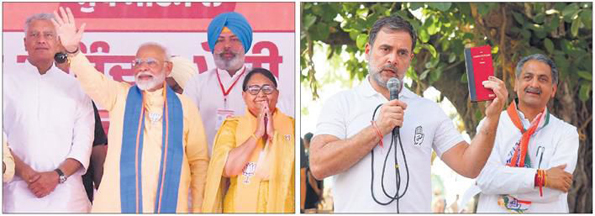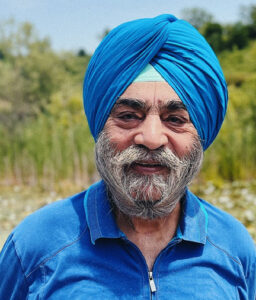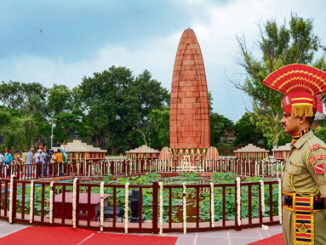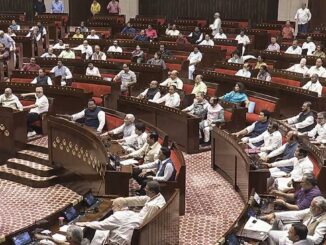
Ballots, not bullets, Punjabis fire differently.
“When the high-pitched campaign was drawing to its conclusion, leaders like Prime Minister Narendra Modi, Home Minister Amit Shah, Defense Minister Rajnath Singh, Finance Minister Nirmala Sitharaman, Chief Ministers of various States, including those governed by BJP and AAP, were in the State promising moon to the State tormented by continuous neglect by the Centre as well as its sinking fiscal health and its strong farm force out in streets demanding acceptance of its long-standing demands.”

Punjabis are unique as they have a style of saying things differently. While the rest of the country was engaged in a war of “hatred”, “communal and religious divides” and “character assassinations” during the first six phases of polling in the Lok Sabha elections, they were greatly amused. Political discourse had touched a new low.
For the last five days, anyone and everyone who matters in the Indian political system, was in Punjab, heaping praises on the people of this border State for their unprecedented contribution not only to the freedom struggle but also in rebuilding the nation after the hard-earned 1947 freedom.
When the high-pitched campaign was drawing to its conclusion, leaders like Prime Minister Narendra Modi, Home Minister Amit Shah, Defense Minister Rajnath Singh, Finance Minister Nirmala Sitharaman, Chief Ministers of various States, including those governed by BJP and AAP, were in the State promising moon to the State tormented by continuous neglect by the Centre as well as its sinking fiscal health and its strong farm force out in streets demanding acceptance of its long-standing demands.
The farm force wanted in a democratic way to question the national political leadership in general and the BJP in particular as to why the farmers were being labelled as “urban Naxalites”, “Khalistanis” or “anti-national elements” for their peaceful agitations in support of their long-standing demands, including guaranteed Minimum Support Price for their produce.
It was this final phase of campaigning that brought the two Prime Ministers – the incumbent and his immediate predecessor – face to face on how democracy should be run or governed.
Intriguingly, it did not happen in any of the first six phases that saw polling for 486 of 543 seats completed. But the last 57 seats that will go to poll on June 1 are different.
Polling is scheduled in all 13 seats of Punjab and four of Himachal Pradesh, 13 constituencies in Uttar Pradesh, nine in West Bengal, eight in Bihar, six in Odisha and three seats in Jharkhand besides Chandigarh. Prime Minister Narendra Modi is seeking a third consecutive term from Varanasi.
The turnout in the first six phases was 66.14%, 66.71%, 65.68%, 69.16%, 62.2% and 63.36% respectively. Counting of votes will be taken up on June 4.
There was nothing unusual in the campaigning as the BJP leaders led by Prime Minister Narendra Modi spared no chance to heap accusations on the Congress and the INDIA alliance leaders of being corrupt, anti-Hindu and engaging in loot, appeasement and dynastic politics. The Opposition parties, too, shot back alleging that the BJP was anti-farmer, anti-youth and was itching to change and scrap the Constitution.
Appealing to emotive voters is an art in which Indian politicians excel. Historic and religious references were galore as they did not stop short of creating wedges among communities to suit their political game plans.
In Punjab, realizing that farmers come from the Jat families, the BJP and others played a calculated plan to woo non-Jats, especially Dalits. In his last rally at Hoshiarpur, PM Modi attempted to strike a rapport with the Dalit dominated audience saying he represented Varanasi, the birthplace of Guru Ravi Dass, and he had come to pay his obeisance at “Chotti Kashi” of Ravidasias (Hoshiarpur).
Elsewhere, PM Modi was going out of way to heap praise on the Sikh community holding that one of “Panj Piaras” of Sri Guru Gobind Singh ji came from Gujarat. Intriguingly, it was during his tenure as Chief Minister of Gujarat, a national holiday on the birth anniversary of the founder of Sri Guru Nanak Dev Ji, was cancelled by him. The Sikh community of Ahmedabad and the rest of Gujarat had strongly protested against the decision of the then BJP government of the State.
As the election campaigning was coming to an end, former Prime Minister, Dr Manmohan Singh, issued a three-page letter to the voters of Punjab. This surprise move by Dr Manmohan Singh has created a furor as he is known to be a man of principles. Dr Manmohan Singh accused Modi of lowering the dignity of public discourse and the gravity of the office of the prime minister by giving “hateful speeches” during the poll campaign. In an appeal to voters of Punjab, Dr. Singh asserted that only the Congress can ensure growth-oriented progressive future where democracy and Constitution will be safeguarded. He also hit out at the BJP government for imposing the “ill-conceived” Agnipath scheme on the armed forces. PM Modi took upon himself the onerous responsibility of spearheading the election campaign. As such he had 206 public outreach programs, including rallies and roadshows, after elections to 18th Lok Sabha were announced on March 16.
In Punjab, where the ruling AAP and its INDIA bloc partner Congress are fighting separately in a multi-cornered contest, the high-decibel campaign saw the participation of almost all top politicians of the country..
For the Congress, Kharge, Rahul Gandhi and Priyanka Gandhi Vadra led the campaign. For AAP, its convener and Delhi CM Arvind Kejriwal, got interim bail from the Apex Court to campaign for party candidates in Punjab, Delhi and Haryana. Delhi Chief Minister Arvind Kejriwal, out on interim bail in the excise policy case, also led an aggressive campaign for his party candidates along with Punjab Chief Minister Bhagwant Mann.
Modi, while addressing a rally at Hoshiarpur in Punjab, attacked the Congress for “ranting” about the Constitution when it was the one that “strangled” it during the Emergency and did not care about it when Sikhs were killed in the 1984 riots. He also talked about various other issues, including reservations, corruption and Ram Temple.
Hitting out at the Opposition for questioning the Agnipath scheme, he accused the INDIA bloc of making the Army a “weapon of politics” and said there could not be a “bigger sin than this”.
Punjab is known to set new political trends. 2024 is not going to be any different. The results of 13 Punjab seats may have a pack of surprises for many as both national and regional parties are expected to perform differently than anticipated.
(Prabhjot Singh is a senior journalist. He can be reached at prabhjot416@gmail.com)





Be the first to comment